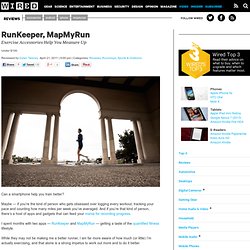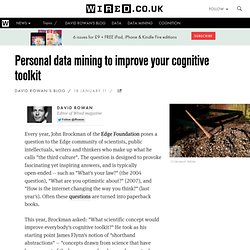

Exercise Accessories Help You Measure Up. Can a smartphone help you train better?

Maybe — if you’re the kind of person who gets obsessed over logging every workout, tracking your pace and counting how many miles per week you’ve averaged. And if you’re that kind of person, there’s a host of apps and gadgets that can feed your mania for recording progress. I spent months with two apps — RunKeeper and MapMyRun — getting a taste of the quantified fitness lifestyle. While they may not be making me a better runner, I am far more aware of how much (or little) I’m actually exercising, and that alone is a strong impetus to work out more and to do it better. The apps show how a smartphone can turn into a collection point for an array of health and fitness data, including speed, distance, elevation, heart rate and other workout metrics such as calories and cadence (the measurement of steps or pedal strokes per minute). Personal data mining to improve your cognitive toolkit. David Rowan Editor of Wired magazine Every year, John Brockman of the Edge Foundation poses a question to the Edge community of scientists, public intellectuals, writers and thinkers who make up what he calls "the third culture".

The question is designed to provoke fascinating yet inspiring answers, and is typically open-ended -- such as "What's your law? " (the 2004 question), "What are you optimistic about? " (2007), and "How is the internet changing the way you think? "